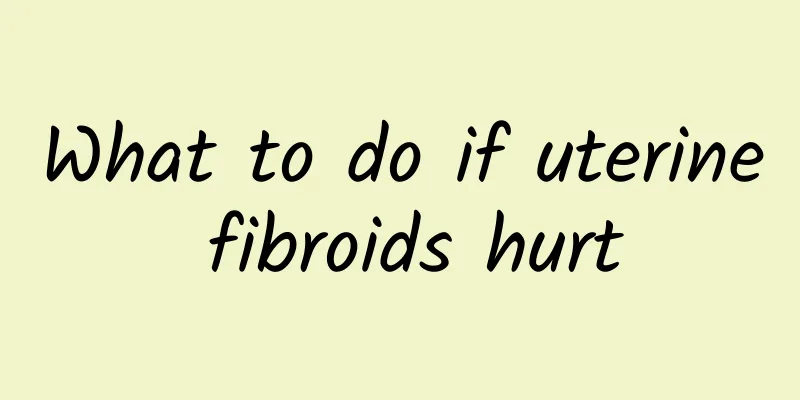What to do if uterine fibroids hurt

|
Uterine fibroids are generally painless, but if they are large, they may cause abdominal pain, and they may also cause pain when they become red. Therefore, if you have uterine fibroids, you must go to the hospital in time, and make a comprehensive assessment based on the size of the fibroids, symptoms, and the nature of the pain, and then choose the appropriate method for treatment. If necessary, you can use surgical resection to treat it, and after the operation, you must closely observe whether your body has any abnormal symptoms. At the same time, you should also go to the hospital for regular checkups, and do not eat foods containing hormones to avoid recurrence of fibroids. Drugs for the treatment of uterine fibroids The drugs used to treat uterine fibroids are mainly used to alleviate symptoms or reduce the size of uterine fibroids. Generally speaking, if it is intramural fibroids or submucosal fibroids that cause heavy menstrual flow, the drugs used for treatment at this time can be androgens, or hemostatic drugs can be taken during menstruation. They can counteract estrogen and shrink the endometrium, which can reduce bleeding during surgery. In addition, mifepristone can be used, but this drug will cause early menopause, so it is generally suitable for perimenopausal women. Can uterine fibroids cause amenorrhea? Uterine fibroids generally do not cause amenorrhea, but they may have a certain impact on the menstrual cycle, menstrual volume, and menstrual period. If menstruation suddenly stops, the first thing to do is to check whether you are pregnant. If you are not pregnant, and your menstruation is delayed for more than a week, it may be related to endocrine disorders or other reasons. You can do some tests such as B-ultrasound and sex hormones to determine the cause of amenorrhea and then adjust it. Eat and live regularly and avoid spicy and irritating foods. You can take medications to regulate menstruation as prescribed by your doctor and observe. At the same time, you should also treat uterine fibroids in a timely manner and check the size of uterine fibroids regularly. |
<<: How to prepare for pregnancy correctly after abortion?
>>: Cervical erosion folk remedies
Recommend
What is ovulation bleeding?
Many female friends have experienced this situati...
Tailor-made for women! A comprehensive 28-day exercise guide for your menstrual cycle
Whether you have a long-term exercise habit or yo...
Keep warm by jogging! Winter Sports Life Tips
In winter, you don’t want to go out and just want...
Hyperprolactinemia test criteria
Hyperprolactinemia is a common benign prolactin i...
Pyramid training burns 100 calories in 10 minutes
The weather is cold in winter, and all I want to ...
What are the methods to relieve congenital absence of vagina?
Congenital absence of vagina is a common congenit...
Water bottles can also help you lose weight! Kenji Wu takes high school girl to "Ledong"
A survey shows that high school girls exercise fo...
How long does it take to get pregnant after a miscarriage?
How long does it take to get pregnant after a mis...
Six essentials for female uterine infertility care, three major misunderstandings in the treatment of female cervical inflammation
Protecting your uterus is what every female frien...
Folk remedies for treating adnexitis
Folk remedies for treating adnexitis: Method 1 In...
How to perform ectopic pregnancy surgery
What is ectopic pregnancy? Ectopic pregnancy is a...
5 alternative movements to make abdominal muscle training easier and more powerful for beginners!
An important part of getting started is to focus ...
What is the reason for missing menstruation?
What is the reason for missed menstruation? This ...
What tests are needed for cervicitis
Cervicitis is one of the common gynecological dis...
Why does a molar pregnancy occur?
Molar pregnancy usually occurs due to nutritional...









